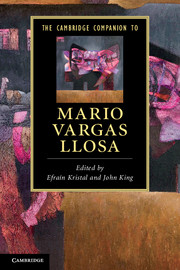Book contents
- Frontmatter
- Introduction
- 1 Reality and rebellion: An overview of Mario Vargas Llosa’s literary themes
- 2 The early novels: The Time of the Hero and The Green House
- 3 The total novel and the novella: Conversation in The Cathedral and The Cubs
- 4 Humour and irony: Captain Pantoja and the Special Service and Aunt Julia and the Scriptwriter
- 5 The historical novel: The War of the End of the World
- 6 Innocence and corruption: Who Killed Palomino Molero? and The Storyteller
- 7 The political novels: The Real Life of Alejandro Mayta and Death in the Andes
- 8 The erotic novels: In Praise of the Stepmother and The Notebooks of Don Rigoberto
- 9 The dictator novel: The Feast of the Goat
- 10 From utopia to reconciliation: The Way to Paradise, The Bad Girl and The Dream of the Celt
- 11 The essays
- 12 The memoir: A Fish in the Water
- 13 The plays
- 14 Film and the novels
- 15 An interview
- Further reading
- General index
- Index of selected fictional characters
- Index of selected works by Vargas Llosa
15 - An interview
Published online by Cambridge University Press: 28 January 2012
- Frontmatter
- Introduction
- 1 Reality and rebellion: An overview of Mario Vargas Llosa’s literary themes
- 2 The early novels: The Time of the Hero and The Green House
- 3 The total novel and the novella: Conversation in The Cathedral and The Cubs
- 4 Humour and irony: Captain Pantoja and the Special Service and Aunt Julia and the Scriptwriter
- 5 The historical novel: The War of the End of the World
- 6 Innocence and corruption: Who Killed Palomino Molero? and The Storyteller
- 7 The political novels: The Real Life of Alejandro Mayta and Death in the Andes
- 8 The erotic novels: In Praise of the Stepmother and The Notebooks of Don Rigoberto
- 9 The dictator novel: The Feast of the Goat
- 10 From utopia to reconciliation: The Way to Paradise, The Bad Girl and The Dream of the Celt
- 11 The essays
- 12 The memoir: A Fish in the Water
- 13 The plays
- 14 Film and the novels
- 15 An interview
- Further reading
- General index
- Index of selected fictional characters
- Index of selected works by Vargas Llosa
Summary
The Feast of the Goat is a novel in which the personal and the political seem to be inextricably intertwined because you focus on the consequences of a dictatorship in the lives of its victims, years and even decades after the regime has ceased to exist. To what extent did your own feelings about Latin American dictators, and not just Trujillo, the dictator of the Dominican Republic, on which the novel is based, play a role in the conception of this novel?
I wrote The Feast of the Goat not only because of Trujillo, but also because of the dictatorships of my own country, those I had experience of in Peru, the Odría dictatorship, for example, and all the various military dictatorships that we experienced in Latin America since the 1950s. In a way, all these experiences come together in the novel, The Feast of the Goat. That being said, the most direct experience that compelled me to write this novel was a stay in the Dominican Republic of eight months in 1975.
Trujillo had been killed many years earlier, but he was still the main topic of conversation among Dominicans of every social class. He was still looming large over the country; sometimes they still spoke of Trujillo with fear. In other cases, they told all kinds of anecdotes, stories, and I heard such incredible things that I started to investigate a little bit, to read the testimonies. My fascination grew, because I think the Trujillo dictatorship was probably the emblematic expression of a phenomenon, of a political phenomenon, that almost all Latin America experienced in the twentieth century. Trujillo had all the characteristics of the dictator.
- Type
- Chapter
- Information
- The Cambridge Companion to Mario Vargas Llosa , pp. 212 - 220Publisher: Cambridge University PressPrint publication year: 2011



